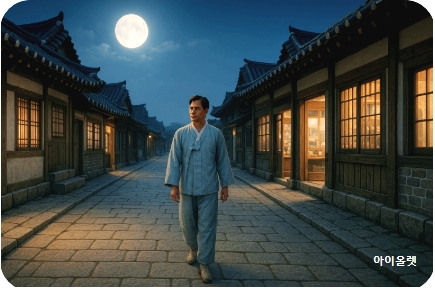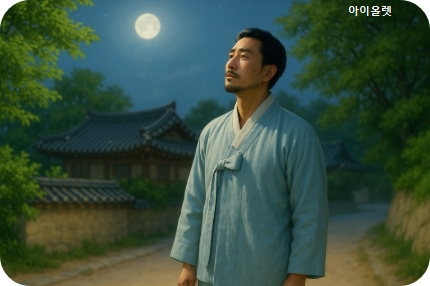하루 10분 그림독서 ⑱ 이태준 '달밤' — 순수한 선의와 인간다움의 회복

우리가 살아가며 마주하는 수많은 순간들 가운데, 아주 사소하지만 오래도록 기억에 남는 만남이 있습니다. 누군가에게 건넨 따뜻한 말 한마디, 혹은 불현듯 다가온 친절이 마음에 새겨져 인생의 한 장면이 되기도 하지요. 이태준의 단편소설 「달밤」은 바로 그런 순간을 담고 있습니다. 일제 강점기의 어둡고 척박한 시대적 배경 속에서, 소설은 인간이 본래 가지고 있는 선한 마음과 인간다움을 환히 비추어 줍니다. 오늘 우리는 그 장면 속으로 함께 들어가, 순수한 선의가 어떻게 우리 삶을 밝히는지를 곱씹어 보려 합니다.
오늘 주제에 맞는 성경 말씀
“너희 모든 일을 사랑으로 행하라.” (고린도전서 16:14)
이 말씀은 그저 거창한 명령이 아니라, 삶의 작은 행동 하나에도 사랑을 담으라는 요청입니다. 「달밤」의 주인공은 가진 것이 없지만, 타인을 향한 따뜻한 시선을 멈추지 않습니다. 이는 물질보다 귀한 인간다움의 증거이며, 성경에서 말하는 사랑의 실천과 깊이 닮아 있습니다.
온 나라의 존경을 받았던 솔로몬, 영화 속에 마무리된 생애
역대하 9:13~31 – 솔로몬의 부와 영화, 그리고 그의 죽음 인류 역사 속에서 가장 지혜로운 왕으로 알려진 솔로몬은 부와 영화의 절정에 올랐습니다. 그러나 성경은 그가 아무리 큰 부와 권세를 누
iallnet12.tistory.com
2. 본문 발췌 (이태준 「달밤」
그날 밤, 종로 거리는 달빛에 잠겨 있었다. 낮 동안의 소란스러움이 거짓말처럼 사라지고, 오직 달빛만이 하얗게 깔려 있었다.

달은 크고도 환하여, 마치 낮과 다름없이 거리를 비추었다. 나는 괜스레 발길이 가벼워 종로 길을 천천히 걸었다.
길을 걷다 보니 어두운 구석에서 휑한 기침 소리가 들려왔다. 가까이 다가가자, 한 사내가 벽에 기대 앉아 있었다. 그의 옷은 해어지고 군데군데 구멍이 났으며, 한쪽 신발조차 제대로 맞지 않았다. 그는 눈을 들어 나를 바라보았다.
“선생님, 혹시… 한 푼만 보태 주실 수 있겠습니까?”
그의 목소리는 힘이 없었으나, 그 안에는 간절함이 서려 있었다. 순간, 나는 주머니를 더듬었다. 그러나 동전 하나 나오지 않았다. 그때의 당혹감과 미안함이 얼굴을 붉혔다. 나는 머뭇거리며 말했다.

“미안하오. 오늘은 아무것도 가진 것이 없소.”
그는 잠시 나를 바라보다가, 뜻밖에도 부드럽게 웃었다.
“괜찮습니다. 이렇게 이야기라도 해 주시니 고맙습니다.”
그 웃음은 피곤하고 지친 얼굴 위에서도 은은하게 빛났다. 나는 오히려 그 말에 가슴이 뭉클해졌다. 아무것도 주지 못했는데도, 그는

고마움을 표현하고 있었다. 마치 인간다움이란 주고받는 돈의 문제가 아니라, 서로의 마음이 닿는 데 있다는 듯이.
나는 잠시 그와 나란히 서서 달을 바라보았다. 달빛은 그의 남루한 옷에도, 나의 그림자에도 똑같이 내려앉아 있었다. 차별 없이, 있는 그대로를 감싸 안는 그 빛은 우리 사이의 거리를 좁혀 주는 듯했다.
그는 문득 어린 시절의 이야기를 꺼냈다. 시골에서 어머니와 함께 살던 시절, 밤마다 마당에 앉아 달을 보며 노래를 부르던 기억 말이다. 어머니가 부르던 자장가가 달빛 아래 고스란히 담겨 있었다고 했다. 나는 그의 이야기에 귀를 기울였다. 그 순간, 나는 돈을 주지 못한 미안함보다, 그의 기억을 함께 나눌 수 있다는 사실이 더욱 값지게 느껴졌다.
우리는 한참 동안 말을 주고받았다. 그는 오늘 하루를 어떻게 버텼는지, 어디서 잠을 청할지, 내일은 무엇을 할지 막막하지만 그래도 살아야 한다는 이야기를 했다. 나는 그저 고개를 끄덕이며 들었다. 그러나 그 대화만으로도 우리는 이미 서로를 깊이 이해하고 있었다.

마침내 그는 자리에서 일어나, 절뚝이며 발걸음을 옮겼다. 달빛은 그의 그림자를 길게 늘리며, 그가 걸어가는 길을 따라갔다. 나는 한동안 그 뒷모습을 바라보다가, 마음속으로 작은 기도를 올렸다. ‘저 사람의 길에도 따뜻한 빛이 늘 함께하길.’
그리고 나는 다시 걸음을 옮겼다. 그러나 그 밤, 종로 거리는 더 이상 이전과 같지 않았다. 달빛은 여전히 환했지만, 내 마음속에 남은 울림은 달빛보다도 더 따스했다.

3. 해설과 적용
이태준의 「달밤」은 짧은 만남을 통해 인간 본연의 선함을 드러냅니다. 주인공은 물질적으로 아무것도 주지 못했지만, 마음을 나누는 대화와 공감이야말로 진정한 나눔임을 깨닫습니다. 이것은 오늘날 우리가 쉽게 잊어버리는 가치이기도 합니다.
“인간다움은 거창한 영웅적 행위가 아니라, 작은 순간의 선의에서 빛난다”는 점이 작품의 핵심입니다.
우리 역시 일상 속에서 누군가에게 건넨 따뜻한 말, 잠시 멈춰 들어준 이야기 한 토막이 누군가의 삶에 깊은 위로가 될 수 있습니다. 때로는 ‘무엇을 주었는가’보다 ‘어떻게 함께했는가’가 더 중요하다는 사실을 「달밤」은 보여 줍니다.
4. 마무리
이태준은 「달밤」을 통해 인간이 가진 본질적인 따뜻함을 확인시켜 줍니다. 시대가 아무리 어둡고 현실이 고단하더라도, 서로를 향한 작은 친절이 있다면 우리는 인간다움을 잃지 않을 수 있습니다. 그것이 바로 우리를 지켜 주는 빛입니다. 오늘 우리의 삶 속에서도 그러한 선의를 실천할 수 있기를 소망합니다.
다음 편 예고
[하루 10분 그림독서 ⑲] 이상 「날개」 — 자아의 분열과 인간 존재의 갈망
출처
- 본문: 이태준, 「달밤」, 1933
- 성경: 개역개정판
◆ View the English translation. Click below.
10-Minute Reading Series ] Lee Tae-jun’s "Moonlit Night" — Rediscovering Pure Goodness and Humanity
Introduction
There are fleeting encounters in life that linger long after they pass. A simple warm word, a brief moment of kindness—these can become memories that shape us. Lee Tae-jun’s short story Moonlit Night is one such work. Written during the turbulent 1930s under Japanese colonial rule, it reminds us of the purity of human goodness and the quiet dignity of compassion. In today’s reading, we step into the world of this story to reflect on how even the smallest gestures of kindness can illuminate our lives.
Bible Verse for Today
“Let all that you do be done in love.” (1 Corinthians 16:14)
This verse is not a lofty command but a simple reminder that love must be woven into our smallest actions. In Moonlit Night, the protagonist has nothing material to give, yet he does not turn away from another’s need. This is the true reflection of humanity, echoing the biblical call to act in love at all times.
Story Excerpt (Lee Tae-jun’s Moonlit Night, extended reading )
That night, the Jongno streets were bathed in silver light. The bustle of the day had disappeared, leaving behind only the quiet glow of the moon. The moon hung large and bright, illuminating the street as though it were daylight. I walked slowly, my footsteps light, letting the silence guide me.
Suddenly, I heard a faint cough from the corner of an alley. Approaching, I saw a man slumped against a wall. His clothes were worn and torn in many places, and one shoe barely clung to his foot. He looked up at me with weary eyes.
“Sir, might you spare me a coin?”
His voice was weak but carried a desperate sincerity. My hand instinctively went to my pocket, only to find it empty. Embarrassment washed over me as I muttered, “I am sorry. I have nothing with me tonight.”
The man paused, then to my surprise, a faint smile crossed his face.
“It is all right. It is enough that you stopped and spoke to me.”
That smile, worn yet gentle, pierced through the quiet of the night. Though I had given him nothing material, he expressed gratitude as though my words alone were a gift. In that moment, I realized that humanity was not measured in coins but in the warmth of connection.
We stood side by side beneath the moonlight. The silver glow fell equally on his ragged clothing and on my shadow. The light made no distinction, embracing us both as though to remind us of our shared existence.
Then, he began to speak of his childhood. He recalled nights in the countryside, sitting in the yard with his mother, singing lullabies beneath the same bright moon. His voice trembled as he told the story, yet in it was a tenderness that transcended hardship. I listened silently, finding his memory to be more precious than any gift I could have offered.
We talked for some time—about his struggles to survive the day, about his uncertain tomorrow, about his determination to keep living despite it all. I only nodded and listened. Yet in that act of listening, something profound passed between us.
At last, he rose to his feet, limping as he walked away. The moonlight stretched his shadow far across the street, as though walking beside him. I watched his figure retreat into the night, and in my heart, I whispered a quiet prayer: “May light always guide his path.”
As I turned to walk again, I realized that Jongno was no longer the same street I had entered. The moon was still shining, but my heart carried a warmth deeper than moonlight.
Reflection and Application
Lee Tae-jun’s Moonlit Night reveals humanity’s innate goodness through a simple encounter. The protagonist offers no material help, yet the act of sharing a moment, of listening, becomes more valuable than silver or gold.
The story teaches us that “true humanity shines not in grand heroic acts but in small, sincere gestures of kindness.”
Today, we too live in hurried lives where kindness is easily forgotten. Yet a single word of comfort, a willingness to pause and listen, may become a source of strength for someone else. Often it is not about what we give but how we are present with others.
Conclusion
Through Moonlit Night, Lee Tae-jun reminds us that kindness is the very thread that holds humanity together. Even in dark times, compassion allows us to remain fully human. May we too carry such light in our daily encounters, shining on those around us as surely as the moon shines on the night.
Next Episode Preview
[10-Minute Reading Series ⑲] Yi Sang’s Wings — Fragmentation of Self and the Longing for Existence
Sources
- Text: Lee Tae-jun, Moonlit Night (1933)
- Bible: ESV
#LeeTaejun, #MoonlitNight, #10MinuteReading, #KoreanLiterature, #Humanity, #PureKindness, #Jongno, #LiteraryReflection, #BibleVerse, #Inspiration
끝까지 읽어 주셔서 감사합니다.
◆ 제 다른 글 소개
‘길복순’ 속 휴가 언급이 현실이 되다 — 영화 ‘사마귀’ 돌아오다
‘길복순’ 속 휴가 언급이 현실이 되다 — 영화 ‘사마귀’ 돌아오다 넷플릭스가 다시 한 번 강렬한 한국 ...
blog.naver.com
영화 ‘피렌체’로 연기 복귀 선언한 김민종
영화 ‘피렌체’로 연기 복귀 선언한 김민종 – 20년 만의 스크린 귀환 배우 김민종이 무려 20년이라는 긴 ...
blog.naver.com
'유익한 정보 좋은 글' 카테고리의 다른 글
| 경계 설정의 용기 -착한 사람에서 건강한 사람으로 (11) | 2025.09.27 |
|---|---|
| 흑색종 예방과 치료, 점 하나가 말하는 경고등 (11) | 2025.09.27 |
| 당뇨 잡는 음식 7가지, 먹고 나서 효과 체감하는 사람들 후기 (15) | 2025.09.26 |
| 선택의 순간, 지혜로 미래를 세운다 (12) | 2025.09.26 |
| 육종 – 뼈와 근육에서 시작되는 희귀암의 경고 신호 (17) | 2025.09.25 |


